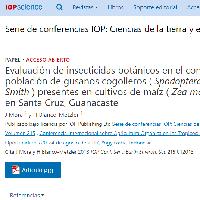Resumen
- Botanical insecticides manufactured under the name of spinetoram, Solaris 6 SC® (75 ml.ha-1) and Capsoil 9,82 EC® (Capsicumm annum + mustard (Sinapis alba) + garlic (Allium sativum) (2 l.ha-1) were evaluated by comparing them with two homemade extracts: garlic extract + neem (Azadirachtaindica) + detergent (20 ml.l-1 water) and garlic extract + oregano (Origanumvulgare) + juanilama (Lippia alba) + rosemary (Rosmarinusofficinalis) (20 ml.l-1 water); and a control with the objective to evaluate the effectiveness of non-chemical alternatives to treat the Spodopterafrugiperda in the corn crops of the test field in Santa Cruz, Guanacaste which is owned by the University of Costa Rica. Results show that the best insecticide to control the immature fall armyworm is Solaris 6 SC®, followed by the insecticide made of garlic extract, neem, and detergent. Also, the natural parasitism of the S. frugiperda on the area not treated with pesticides reached values of 60% where the Chelonus sp. was the parasitoid that was present at all times. The performance of the areas treated with pesticides range from 153 and 180 quintals of fresh corn by hectare where the insecticide made of garlic extract, neem, and detergent (20 ml.l-1 water) reflected the higher production. The areas treated with Solaris 6 SC® had the less quantity of corn damaged by S. frugiperda and Helicoverpazea while the area treated with garlic extract + oregano + juanilama + rosemary had the greatest loss during this evaluation. Thus, the insecticide made of garlic extract, neem, and detergent is recommended because of its high capacity to kill S. frugiperda and other pests that affect the corncob, its higher performance it is more cost efficient for small farmers.
